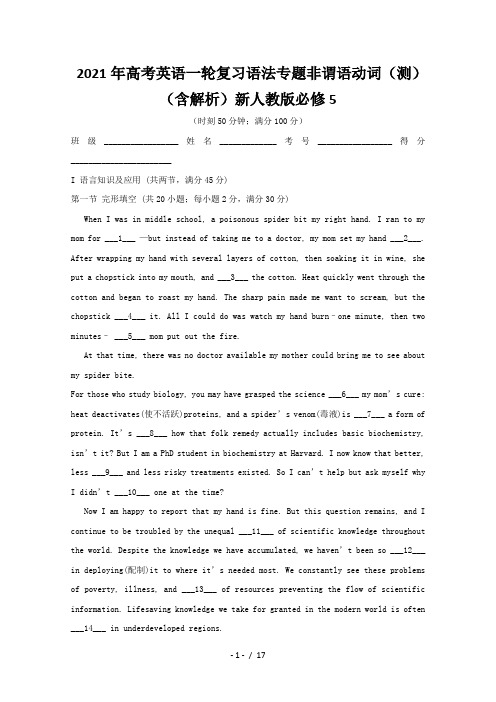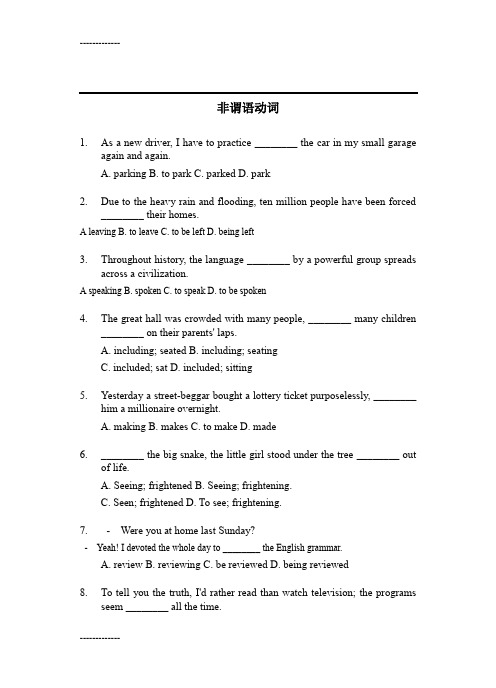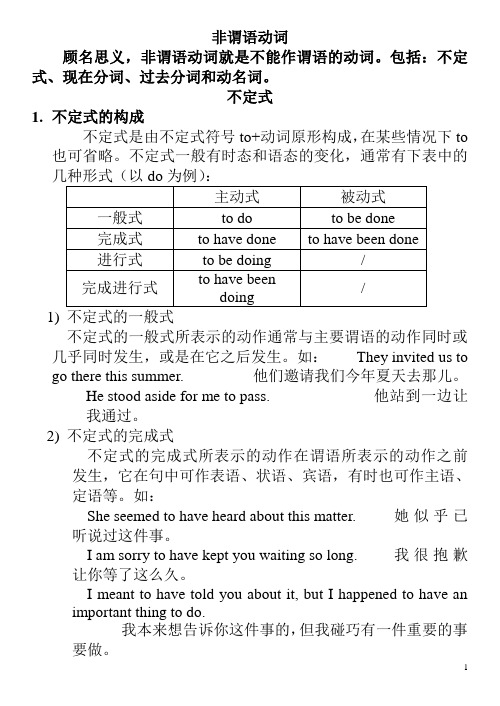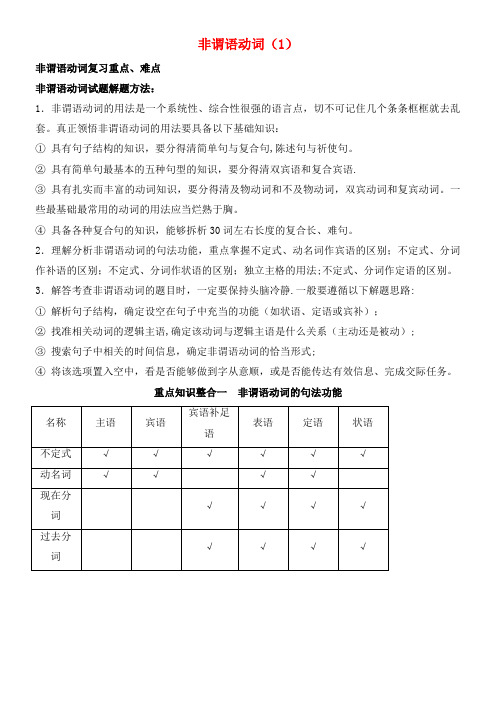高中英语 必考非谓语动词(不定式)精讲精练 新人教版必修5
高中英语必考非谓语动词(不定式)精讲精练新人教版必修5

高中英语必考非谓语动词(不定式)精讲精练新人教版必修5不定式1.不定式作主语eg: 1. To play with snow is very interesting.2. It is important to study English well.3. To be obeyed is natural to her.练习: 1. ______( die ) for people is a glorious thing.2. ______( talk ) with him is a great pleasure.3. ______( see ) is to believe.4._____________________ (beat) in the home match was a disgrace to them..5. 在一个小时之内记住所有这些单词是不容易的。
(翻译成英文)2.不定式作表语eg. 1. Her daughter’s wish is to become a singer.2. She seems to go with us.3.The boy seems to have been beaten.练习: 1. Her work is ______( look )after the children.2. My aim is ______( go ) to Tsinghua University.3. She seemed ______( think ) about the problem.4. He appeared _____________________ (wait) for a long time.5. The box seems _________________ (move).3.不定式作宾语Eg. 1.He wants to go to the zoo tomorrow.2. I don’t know what to do.3. The company’s new car has ________________(design) in two months.练习:1. They wanted ______( get ) on the bus, didn’t they?2.He said he wished______(be )a professor.3.I agreed______ (go ) there with the doctor.4.They asked __________(send) to work here.5.He promised ________________(wait) at the door when she came out.4.不定式作宾语补足语Eg. 1. She told her child not to play on the street.2.I saw her come into the building.3. We believe him to have gone abroad.练习:1. I didn’t want my parents ______(help ) me.2. We’d prefer you _______( take ) the job instead of Zhang.3. The school ordered all the classroom ______( clean ).4. My parents expect me _______( go )to a ideal university.5. Joan promised the dinner ______( cook ) before we returned.5.动词不定式作定语Eg. 1. The last one to arrive will pay the meal.2. Please give me something to eat.3. This is the rule to be followed.练习1. The next train _________(arrive) was from New York.2. On Sundays, he always has a lot of letters_____________( write) .3. We students should have the courage ____________(face) any difficulty.4. She has a child _________(take) care of.5. He has no friend __________(depend) on.6.Pual said, “Give me a chair ____________, please.”A. to sitB. sitC. sit onD. to sit on7. They have found the way (in which)__________ ( solve) the problem.8. The case ____________________ (investigate) is rather complicated.6. 动词不定式作状语Eg. 1. We study hard ( in order) to serve the people heart and soul.2. I hurried to the station only to find the train had left.不定式作状语可以表示行为的目的、结果、原因等1. I‘m saving up __________ (buy) a computer. ( )2. He didn't run fast enough t______________(catch) the train. ( )3. I am glad __________(see ) you. ( )4. He was very sad _____________ (lose) his puppy. ( )7. 独立成分Eg. To tell you the truth, I don’t believe him.To be honest, I don’t l ike this book..8. 请写出只能接不定式作宾语的动词。
高考英语一轮复习语法专题非谓语动词(测)(含解析)新人教版必修5

2021年高考英语一轮复习语法专题非谓语动词(测)(含解析)新人教版必修5(时刻50分钟;满分100分)班级_________________姓名_____________考号_________________得分_______________________I 语言知识及应用 (共两节,满分45分)第一节完形填空 (共20小题;每小题2分,满分30分)When I was in middle school, a poisonous spider bit my right hand. I ran to my mom for ___1___ —but instead of taking me to a doctor, my mom set my hand ___2___. After wrapping my hand with several layers of cotton, then soaking it in wine, she put a chopstick into my mouth, and ___3___ the cotton. Heat quickly went through the cotton and began to roast my hand. The sharp pain made me want to scream, but the chopstick ___4___ it. All I could do was watch my hand burn–one minute, then two minutes– ___5___ mom put out the fire.At that time, there was no doctor available my mother could bring me to see about my spider bite.For those who study biology, you may have grasped the science ___6___ my mom’s cure: heat deactivates(使不活跃)proteins, and a spider’s venom(毒液)is ___7___ a form of protein. It’s ___8___ how that folk remedy actu ally includes basic biochemistry, isn’t it? But I am a PhD student in biochemistry at Harvard. I now know that better, less ___9___ and less risky treatments existed. So I can’t help but ask myself why I didn’t ___10___ one at the time?Now I am happy to report that my hand is fine. But this question remains, and I continue to be troubled by the unequal ___11___ of scientific knowledge throughout the world. Despite the knowledge we have accumulated, we haven’t been so ___12___ in deploying(配制)it to where it’s needed most. We constantly see these problems of poverty, illness, and ___13___ of resources preventing the flow of scientific information. Lifesaving knowledge we take for granted in the modern world is often ___14___ in underdeveloped regions.While studying at Harvard, I saw ___15___ scientific knowledge can help others in simple, yet profound ways. The bird flu pandemic in the 2000s looked to my village like a spell cast by devils. When I realized that simple hygiene(卫生)practices like ___16___ different animal species could contain the spread of the disease, and that I could help make this knowledge available to my village, that was my first “Aha” moment as a budding scientist.Harvard dares us to dream big, to aspire(立志)to change the world. Here on this Commencement Day, we are probably thinking of ___17___ destinations and big adventures that await us. As for me, I am also thinking of the farmers in my village. My experience here ___18___ me how important it’s for researchers to communicate our knowl edge to those ___19___. Because by using the science we already have, we can probably bring my village and thousands like it into the world you and I take ___20___ every day. And that’s an impact every one of us can make!语篇解读:这是一位哈弗博士生在毕业典礼上演讲内容的一部分。
(整理)人教版新课标高中英语必修5-非谓语动词DOC

非谓语动词1. As a new driver, I have to practice ________ the car in my small garageagain and again.A. parkingB. to parkC. parkedD. park2. Due to the heavy rain and flooding, ten million people have been forced________ their homes.A leaving B. to leave C. to be left D. being left3. Throughout history, the language ________ by a powerful group spreadsacross a civilization.A speaking B. spoken C. to speak D. to be spoken4. The great hall was crowded with many people, ________ many children________ on their parents' laps.A. including; seatedB. including; seatingC. included; satD. included; sitting5. Yesterday a street-beggar bought a lottery ticket purposelessly, ________him a millionaire overnight.A. makingB. makesC. to makeD. made6. ________ the big snake, the little girl stood under the tree ________ outof life.A. Seeing; frightenedB. Seeing; frightening.C. Seen; frightenedD. To see; frightening.7. - Were you at home last Sunday?- Yeah! I devoted the whole day to ________ the English grammar.A. reviewB. reviewingC. be reviewedD. being reviewed8. To tell you the truth, I'd rather read than watch television; the programsseem ________ all the time.A. to get worseB. to be getting worseC. to have got worseD. getting worse9. After the Arab states won independence, great emphasis was laid oneducation, with girls as well as boys ________ to go to school.A. to be encouragedB. encouragingC. encouragedD. beencouraged10. ________ that it was going to snow, the climbers decided to put off theirattempt on the highest mountain.A. Having toldB. Having been toldC. TellD. Telling.11. ________ time and labor, cartoonists generally draw the hands of theircharacters with only 3 fingers and a thumb.A. To saveB. SavedC. SavingD. Having saved.12. I am busy ________ for the entrance examination, so I can't help________ housework at home.A. preparing; doingB. preparing; to doC. to prepare; doingD. to prepare;to do13. In order to protect our planet, ________.A. all kinds of pollution should be reducedB. we should reduce all kinds of pollutionC. the environment should be protected firstD. it's important to protect our environment14. Hoping he would not be seen, Bob stole in, ________ his schoolbag andrushed out.A. picking upB. picked upC. to pick upD. having picked up15. ________ money if you can and many poor children in the poormountainous areas will be able to go back to school.A. Having givenB. GivenC. To giveD. Give.16. While listening to pop music, ________.A. she felt asleepB. the light went outC. someone knocked at the doorD. and she couldn't help laughing17. ________, J. K. Rowling is considered to be the best fiction writer.A. Having sold millions of copies of her books.B. Because millions of copies of her books are sold.C. Sold millions of copies of her books.D. Selling millions of copies of her books.18. - Did you enjoy yourself last night?- It's very nice of you. I appreciated ________ to the party.A. to be invitedB. to have invitedC. being invitedD. having beeninvited19. If you go to the West Lake in Hangzhou, you will find it more attractivethan commonly ________.A. supposingB. to supposeC. supposedD. being supposed20. - Kate shouldn't have done that sort of thing.- Whatever she did was reasonable, ________ to what you had done. Besides, it's none of your business. Get down to ________ your work.A. comparing; doingB. comparing; doC. compared; doingD. compared;do21. The woman found it no good ________ her daughter too much money.A. givingB. being givenC. givenD. gave22. He felt it a great honour ________ to visit me when I was in his city.A. to have been takenB. to have takenC. having takenD. being taken23. Her dress has become loose. She appears ________ weight.A. to loseB. being lostC. losingD. to have lost24. The building ________ will be completed in a month. It will be our labbuilding.A. to paintB. being paintedC. to have paintedD. painting25. I find these problems are easy ________.A. to be worked outB. to work them outC. to work outD. to be workedthem out26. - What do you think of last night's lecture?- ________ speaking, I thought it was rather boring.A. RealB. GeneralC. FairD. Honestly.27. Nancy let me repeat her instruction ________ sure that I understood whatwas ________ after she was away on business.A. to make; to be doneB. making; doingC. to make; to doD. making; todo28. The purpose of new drugs used on patients is to make them less painful,________ them more terrible.A. not makeB. not to makeC. not makingD. do not make29. Last night I saw Yang Weiwei lying in bed, ________ in deep thought.A. lostB. losingC. to loseD. being lost30. - Is it ________ the bad smell that is difficult?- Of course.A. how getting rid ofB. got rid ofC. to get rid ofD. being got rid of31. The ________ look in her face suggested that she ________ it before.A. surprising; wouldn't knowB. surprised; hadn't knownC. surprising; hadn't knownD. surprised; shouldn't know32. - The last one ________ pays the meal.- Agreed!A. arrivedB. arrivesC. to arriveD. arriving33.. ________ in a simple living atmosphere was what her parents wished for.A. The girl to be educatedB. The girl educated.C. The girl's being educatedD. The girl was educated.34. – What do you think made him so sad?- ________ his new wallet.A. As she lostB. Lost.C. LosingD. Because of.35. The bank is reported in the evening paper ________ in broad daylightlast week.A. to be robbedB. to have been robbedC. robbedD. having been robbed36. - Come on, please give me some ideas about the project.- Sorry. With so much work ________ my mind, I almost break down.A. filledB. fillingC. to fillD. being filled37. If we have illegal immigrants ________ in, many local workers will losetheir jobs.A. cameB. comingC. to comeD. having come38. At the beginning of class, the noise of desks ________ could be heardoutside the classroom.A. opened and closedB. to be opened and closedC. being opened and closedD. to open and close39. Bob is never willing to alter any of his opinions. It's no use ________with him.A. to argueB. arguingC. arguedD. having argued40. Mark often attempts to escape ________ whenever he breaks trafficregulations.A. having been finedB. to have been finedC. to be finedD. being fined41. When I caught him ________ I stopped buying things there and starteddealing with another shop.A. cheatingB. cheatC. to cheatD. to be cheating42. Although the movie had already been on for ten minutes, I still was notable to find a seat ________.A. to sit onB. to sitC. for sittingD. for me sitting43. He got well-prepared for the job interview, for he couldn't risk ________the good opportunity.A. to loseB. losingC. to be lostD. being lost44. The old farmer, ________ the badly-injured and wounded soldier, cameout of the burning house, ________ for help.A. supporting; callingB. supported by; calledC. being supported by; calledD. being supporting; called45. ________ the exam, the boy was punished by his father.A. No passingB. Having passedC. Not passingD. Not having passed.46. ________ made her parents very angry.A. Jane's engaging BlackB. Jane's being engaged to Black.C. Jane having engaged to BlackD. Jane has engaged to Black.47. The thief missed ________ and ________.A. to be caught; to break awayB. being caught; breaking awayC. to be caught; broke awayD. being caught; broke away48. ________ from what he said, he must be the thief who has stolen the car.A. JudgingB. JudgedC. To judgeD. Judge.49. Time ________, I can have done it better.A. permitB. be permittedC. permittingD. to permit50. I don't know whether you happen ________, but I'm going to study in theU. S. A. this September.A. to be heardB. to be hearingC. to hearD. to have heard。
高中语法非谓语动词精讲精练

非谓语动词顾名思义,非谓语动词就是不能作谓语的动词。
包括:不定式、现在分词、过去分词和动名词。
不定式1.不定式的构成不定式是由不定式符号to+动词原形构成,在某些情况下to 也可省略。
不定式一般有时态和语态的变化,通常有下表中的几种形式(以do为例):1)不定式的一般式不定式的一般式所表示的动作通常与主要谓语的动作同时或几乎同时发生,或是在它之后发生。
如:They invited us to go there this summer. 他们邀请我们今年夏天去那儿。
He stood aside for me to pass. 他站到一边让我通过。
2)不定式的完成式不定式的完成式所表示的动作在谓语所表示的动作之前发生,它在句中可作表语、状语、宾语,有时也可作主语、定语等。
如:She seemed to have heard about this matter. 她似乎已听说过这件事。
I am sorry to have kept you waiting so long. 我很抱歉让你等了这么久。
I meant to have told you about it, but I happened to have animportant thing to do.我本来想告诉你这件事的,但我碰巧有一件重要的事要做。
It has been an honor for me to have traveled so much in your country.对我来说,在你们国家旅行这么多地方是一件很荣幸的事情。
3)不定式的进行式不定式的进行式表示正在进行的与谓语动词同时发生的动作。
它在句中可以用作除谓语以外的所有成分。
如:It’s nice of you to be helping us these days.你真好,这些天一直帮我们。
He pretended to be listening to the teacher carefully. 他假装在认真地听老师讲课。
非谓语动词考点精讲精练(含答案) 讲义--2023届高考英语一轮复习

胆置黑词考,牖讲含蜜g)讲义非谓语动词是高考语法填空和短文改错必考热点语法工程之一。
现结合典型考题对非谓语动词的考点进行梳理和总结,帮助大家明确考点,找出解题规律和方法。
一、考查非谓语动词作主语能作主语的非谓语动词有不定式和动名词。
两者的区别是:表示某一具体的动作时、多用不定式;表示比拟抽象的一般的行为倾向时,多用动名词。
当动名词或不定式短语较长时,常用it作形式主语放在句首而把动名词或不定式短语放于句末。
(典例】(ignore) the difference between the two research findings will be one of the worst mistakes you make.解析:Ignoring。
分析句子结构可知,本句的谓语动词是will be,因此前面局部是主语,应该使用动名词短语作主语。
二、考查非谓语动词作宾语不定式和动名词都可作动词或介词的宾语。
有些动词后只跟不定式作宾语,如want, wish, hope, manage, demand, promise, refuse, pretend, plan, offer, decide, agree, expect等。
有些动词后只跟动名词作宾语,如admit, appreciate, avoid, consider, delay, dislike, enjoy, escape, excuse, finish, forgive, imagine, keep, mind, miss, practice, resist, risk, suggest, deny, stand 等。
有些动词或动词短语后既可以跟不定式,又可以跟动名词作宾语,如forget, remember, regret, mean, try, go on等,但意义上有区别。
[典例1 ] I showed them I was independent by wear strange clothes.解析:wear改为wearing”介词by后应接动名词作宾语。
精选高中英语非谓语动词讲解 (整理)

非谓语动词非谓语动词包括不定式(to do)、动名词(-ing)、现在分词(-ing)与过去分词(-ed)。
它们不受主语人称动词不定式定义:动词不定式是非谓语动词的一种,它没有人称和数的变化,在句子中不能独立作谓语,但它仍保持动词的特点,可以有自己的宾语和状语。
1. 不定式的一般式:一般式表示的动作或状态发生在谓语动词表示的动作或状态的同时或之后。
当不定式的逻辑主语是这个不定式所表示的动作的承受者时,不定式一般要用被动式(to be done).eg: He seemed to be tired. The building to be finished next month is for our teachers.2. 不定式的进行式:进行式表示动作正在进行,与谓语的动作同时发生。
e.g. When I went to his home, he happened to be traveling around the world.3. 不定式的完成式:如果不定式所表示的动作或状态发生在谓语动词所表示动作或状态之前,就用完成式;若是在此基础上的被动含义,就用完成被动式( to have been done).e.g. He is said to have written a novel about the Long March.He is said to have been taught French when he was a child.4. 不定式的完成进行式:如果不定式的动作是在谓语所表示的时间之前一直在进行或有可能继续进行的动作,就要用完成进行式.eg: We’re happy to have been working with the experts all the month.二、不定式的用法:1. 不定式做主语:不定式做主语一般表示具体的某次动作。
而动名词doing 表示习惯的,经常的动作。
高中语法非谓语动词之动词不定式讲解及练习共27页文档

10、一个人应该:活泼而守纪律,天 真而不 幼稚, 勇敢而 鲁莽, 倔强而 有原则 ,热情 而不冲 动,乐 观而不 盲目。 ——马 克思
66、节制使快乐增加并使享受加强。 ——德 谟克利 特 67、今天应做的事没有做,明天再早也 是耽误 了。——裴斯 泰洛齐 68、决定一个人的一生,以及整个命运 的,只 是一瞬 之间。 ——歌 德 69、懒人无法享受休息之乐。——拉布 克 70、浪费时间是一桩大罪过。——卢梭
高中语法非谓语动词之 动词不定式讲解及练习
6、纪律是自由的第一条件。——黑格 尔 7、纪律是集体的面貌,集体的声音, 集体的 动作, 集体的 表情, 集体的 信念。 ——马 卡连柯
8、我们现在必须完全保持党的纪律, 否则一 切都会 陷入污 泥中。 ——马 克思 9、学校没有纪律便如磨坊没有水。— —夸美 纽斯
高中英语非谓语动词精讲精练—动词不定式

高中英语非谓语动词精讲精练—动词不定式动词不定式的构成动词不定式由“to+ 动词原形”构成,如:to study, to play,动词不定式虽然不能作谓语动词用,但仍留着动词的特征,它可以带有所需要的宾语或状语而构成动词不定式短语,如:to study hard, to play table tennis。
动词不定式的句法作用:动词不定式能起名词、形容词和副词的作用,可在句中作主语、表语、宾语、宾语补足语、定语和状语。
主语:不定式做主语,常常用it做形式主语,而把不定式放后面表语:多说情况下,不定式做表语,可转换为做主语宾语:只能做某些动词的宾语,一般不做介词的宾语定语:不定式做定语,要放在修饰词的后面状语:不定式做状语,其逻辑主语要和主语一致动词不定式的形式变化:1. 不定式作主语动词不定式作主语时,句子的谓语动词常用单数,其位置有以下两种:(1)把不定式置于句首。
如:To get there by bike will take us half an hour.To take exercise every day is beneficial to health.To solve this problem in such a short seems impossible.To do that sort of thing is foolish.(2)用it作形式主语,把真正的主语不定式置于句后,常用于下列句式中。
如:①It+be+名词+to doIt’s our duty to take good care of the old.②It takes sb+ some time +to doHow long did it take you to finish the work?③It+be+形容词+for sb+to doIt is difficult for us to finish writing the composition in a quarter of an hour.④It+be+形容词+of sb+to doIt is stupid of you to write down everything the teachersays.⑤It seems (appears) +形容词+to do seem 常用句式为“It seems that …..”和“sb seems to do sth …..”表示“似乎、好像”的意思。
非谓语动词不定式形式讲义(高中英语)

❀
不定式做表语 ① 表示主语的职业、职责、性质等 I found a part-time job, which is to guide the patients. Our duty is to help those people find their parents. ② 主语是aim, purpose, idea, intention, plan, wish, decision, choice等词 The intention of this book is to introduce popular science My wish is to travel around the world.
不定式的完成进行式
(3)完成进行式:to have been doing Robin is known to have been studying abroad for a while, but we don’t know which country.. 不定式的完成进行式表示的动作谓语动词动作发生之前一直在进行 。
❀
不定式做宾语
常与不定式做宾语连用的动词有:want, hope, wish, offer, fail, plan, learn, pretend, refuse, manage, help, agree, promise, prefer。 如果不定式(宾语)后面有宾语补足语,则用it作形式宾语,真正的宾语 (不定式)后置,放在宾语补足语后面, . ☞Marx found it important to study the situation in Russia.
❀
不定式做状语
① 表目的: ☞He worked day and night to get the money. ☞She sold her hair to buy the watch chain. ☆ 注意不定式放句首时,逻辑主语与句子主语要一致: 请判断以下几个句子是否正确:
高中英语语法精讲非谓语动词

单击此处添加文本具体内容,简明扼要的阐述您的观点。根据需要可酌情增减文字,以便观者准确的理解您传达的思想。
动词不定式的时态 不定式虽没有人称和数的变化,但所表达的动作仍有时间先后顺序,具体形式如 下表所示(以动词write为例):
时态
不定式
一般式
to write
进行式
to be writing
• 分析题干可知,动词的非谓语形式的逻辑主语Linda与spend之间为主动关系,故排除B项;非 谓语动词所表达的动作发生在句子谓语appears之前,应用完成式,排除A、D两项,故选C。
• 难题1. 选词填空
B
• Explosion happened in the town early Monday, ______ two visitors.
• A. begun • B. beginning • C. having begin • D. to begin
• “会议开始”是主动含义,故排除含有被动含义的选项A;根据语境,会议在几个小时后才会 召开,故排除含“正在开始”含义的选项B和“已经开始”含义的选项C;D选项的不定式有 主动和将来含义,符合题意。
单击此处添加标题
(2) 不定式的进行式。 不定式的进行式所表示的动作正在进行,与谓语动词所表示的动作同时发生。 例如: The naughty boy pretended to be reading when his mother came in. 当他妈妈进来时,这个淘气的男孩假装正在看书。 I’m glad to be traveling with you. 我很高兴和你一起旅游。
单击此处添加标题
1.He is thought ____B__ foolishly. Now he has no one but himself to blame for losing the job. A. to act B. to have acted C. acting D. having acted
高中英语语法非谓语动词精讲精练

2.原因状语 eg:1.Because he was ill,he had to stay at home. =Being ill,he had to stay at home. 2.Because you are a student,you must study hard. =Being a student,you must study hard. 3.__I couldn’t go to school in my childhood. A.Poor B.Being poor C.To be poor
V-ing所充当的句子成分
一、作主语 1.直接作主语 eg:1.Seeing is believing. 2.Smoking isn’t allowed here.
2.用it作形式主语 it’s no use/useless(做…是没用的)/no good/no help/a waste of time +doing eg:It’s no use waiting here.
⑤start sb/sth doing使…开始…. eg:The smoke started her coughing. ⑥catch sb doing=sb be caught doing撞见某 人做某事 eg:1.The teacher caught him___(sleep) in the class.
位置:单个v-ing作定语放在所修饰的名词之 前,V-ing短语作定语放在所修饰的名词之后。 1.V-ing表示所修饰词的用途 eg:a swimming pool游泳池 a sleeping bag睡袋 a washing machine洗衣机
高中英语非谓语动词用法详解及练习(含答案详解)

非谓语动词之五兆芳芳创作非谓语动词(一)——动词不定式动词不定式、分词(现在分词,过来分词)和动名词统称为非谓语动词.现代英语将现在分词和动名词合为一大类叫作v + ing形式.这些动词的形式不克不及在句中单独作谓语用,因而没有语法主语.但可以有逻辑主语.由于没有语法主语,也就不受人称和数的限定,因为不是谓语,也就没有时态和语态,但这些词仍能暗示动作和状态,所以仍有暗示与其他动词相对时间关系的形式.由于与其它词有逻辑上的主谓关系,因此也有暗示主、主动的形式,同时也有自己的宾语和状语,一起组成非谓语动词的短语(动词不定式短语,分词短语,动名词短语).动词不定式、过来分词及v-ing形式在句中均不克不及作谓语用,所以叫做非谓语动词.(一)动词不定式:动词不定式由“to+ 动词原形”组成,如:to study, to play,动词不定式虽然不克不及作谓语动词用,但仍留着动词的特征,它可以带有所需要的宾语或状语而组成动词不定式短语,如:to study hard, to play table tennis.1、动词不定式的形式变更:动词不定式有下列时态和语态的形式变更.2、动词不定式的根本用法:动词不定式能起名词、形容词和副词的作用,可在句中作主语、表语、宾语补足语、定语和状语用,如:(1)作主语:To help each other is good.(动词不定式作主语时,一般可用it作形式主语,而将作主语的动词不定式置于句末,如:It is good to help each other.(2)作表语:My job is to drive them to the power station every day. 动词不定式在系动词be之后作表语,与暗示未来时的be + 动词不定式结构有所区别,如:Our plan is to set up another middle school for the peasants’ children.我们的筹划是给农民子弟再成立一所中学.(句中的谓语动词为is,动词不定式to set up… 为表语,主语为plan,但plan其实不是动词不定式的逻辑主语,即动词不定式to set up所暗示的动作不是主语plan产生的.)We are to set up another middle school for the peasants’ children.我们将为农民的子弟再成立一所中学.(句中的are to set up整个结构为句中谓语,主语为we,同时也是动词不定式to set up所暗示的动作的逻辑主语,即动词不定式to set up所暗示的动作是由we产生的).(3)作宾语:①作及物动词的宾语,如:She wishes to be a musician.;②作某些形容词的宾语:可以有动词不定式为宾语的形容词一般有glad, sorry, afraid, pleased, determined, willing, eager, anxious, ready, sure等,如:I am determined to give up smoking.;③动词不定式一般不作介词的宾语,但动词不定式之前如有疑问词时,就可作介词的宾语,如:Can you give us some advice on what to do next?(4)作宾语补足语,如:Tell the children not to play on the street. 如果句中的谓语动词为see, hear, watch, notice, have, make, let等,作宾语补足语的动词不定式须将to省去,如:I saw a little girl run across the street.(5)动词不定式在句中作宾语,如带有宾语补足语时,须先用it 作形式宾语,而将该动词不定式后置,如:I don’t think i t right to do it that way.(6)作定语:动词不定式作定语时,须位于被其修饰的名词或代词之后,如:Is this the best way to help him? 和定语用的动词不定式如果是不及物动词,不定式前面就要用需要的介词,如:He is the man to depend on. 如果被不定式修饰的名词为place, time, way,不定式前面的介词,习惯上可以省去,如:The old man is looking for a quiet place to live.(7)作状语:动词不定式可以作下列的状语:①目的状语:Every morning he gets up very early to read English. 为了强调不定式暗示目的的作用,可在不定式前加in order to或so as to(以便或为了),但应注意in order to位于句首或句中均可,而so as to不克不及位于句首,如:She reads China Daily every day in order to (so as to) improve her English. 将暗示目的的不定式置于句首,也可强调目的的作用,如:To master a foreign language, one must work hard at it. ②结果状语:They lived to see the liberation of their home town.他们活到亲眼见到了他们故乡的解放.③too + 形容词或副词+ 动词不定式,暗示“足能…”的结果,如:You are old enough to take care of yourself now.3、复合结构不定式:由for + 名词(或代词宾格)+ 动词不定式即组成复合结构的动词不定式.其中for自己无意义.for前面的名词或代词是不定式的逻辑主语,这种不定式在句中可作主语、表语、宾语、定语或状语,如:It is very important for us to get everything ready for the harvest. 当作表语用的形容词暗示不定式的逻辑主语的性质或特征时,就用介词of而不必for引出不定式的逻辑主语,这些形容词一般有good, nice, kind, wise, silly, stupid, foolish, right, wrong, careless, impolite等,如:It is very kind of you to help him every day.4、疑问词+ 动词不定式:疑问代词和疑问副词后可加动词不定式组成不定式短语,在句中可作主语、表语或宾语,如:How to prevent them from swimming in this river is a problem.5、动词不定式的否认式:动词不定式的否认式是由not + 动词不定式组成,如:It’s wrong of you not to attend the meeting.6、动词不定式的时态形式所暗示的时间关系:(1)一般式:动词不定式一般式所暗示的动作是和谓语动词所暗示的动作同时产生,但在多数情况下,是在谓语动词所暗示的动作之后产生,如:We decided to plant more trees this spring.(其后),They often watch us play table tennis.(同时);(2)完成式:动词不定式完成式所暗示的动作产生在谓语动词所暗示的动作之前,如:I am sorry to have kept you waiting.(3)进行式:动词不定式进行式所暗示的动作正在进行中,并且与谓语动词所暗示的动作同时产生,如:She happened to be writing a letter in the room when I came in.7、动词不定式的主动语态用法:如果动词不定式的逻辑主语为这个不定式所暗示的动作的承受者时,不定式一般就用主动语态形式,如:What is to be done next hasn’t been deci ded yet.非谓语动词(二)——动词-ing形式(二)-ing形式:动词的-ing形式也是一种非谓语动词.-ing形式仍保存有动词的特征,可以带有其所需要的宾语或状语而组成-ing短语.1、-ing的形式:-ing有一般式和完成式.及物动词的-ing还有主动语态和主动语态,而不及物动词的-ing则没有主动语态.现在以及物动词make 和不及物动词go为例,将其-ing各类形式列表如下:2、-ing形式的根本用法.(1)作主语:Seeing is believing.百闻不如一见.Talking is easier than doing. –ing作主语时,如果其结构较长,可用it作形式主语,而将作主语的-ing后置.如:It isn’t much good writing to them again. It’s no use waiting here.(2)作表语:Her job is washing and cooking. My hobby is collecting stamps.(3)作宾语:①作及物动词的宾语.She likes drawing very much.;②作某些短语动词的宾语. Mary is thinking of going back to New York.;③do+限定词(my, some, any, the等)+ -ing,暗示“做…事”之意,如:We often do our cleaning on Saturday afternoon. Will you do any shopping on Saturday this afternoon? ④作介词的宾语:Her sister is good at learning physics.;⑤作形容词worth, busy等的宾语:This book is well worth reading. –ing作宾语带有宾语补足语时,要用it作为形式宾语,而将作宾语的-ing后置,如:We found it no good talking like that. Do you think it necessary trying again?(4)作定语:The sleeping child is only five years old. Do you know the man standing at the gate? 注:-ing形式作定语用时,如果-ing只是一个单词,就位于其修饰的名词之前,如果是-ing短语,就位于其修饰的名词之后,-ing作定语时,被-ing所修饰的名词就是该-ing的逻辑主语.另外,-ing作定语用时,其动作和句子谓语动词所暗示的动作是同时进行的,如果不是同时进行的,就不克不及用-ing作定语,要使用定语从句,如:The girl who wrote a letter there yesterday can speak English very well.(5)作宾语补足语:We can see steam rising from the wet clothes. 注:当-ing在复合宾语中作宾语补足语用时,句中宾语就是这个-ing的逻辑主语,可以带有这种复合宾语的动词有see, watch, hear, observe, feel, find, have, keep等.(6)作状语:①时间状语:Seeing Tom, I couldn’t help thinking of his brother. 分词在句中作时间状语时,其前一般可加when或while,如:When crossing street, you must be careful. ②原因状语:Being ill, he didn’t go to school yesterday. ③方法或陪伴状语:Mary stood at the school gate waiting for Betty.3、主动语态-ing完成式的根本用法.主动语态-ing完成式所暗示的动作产生在句中谓语动词所暗示的动作之前,一般在句中作时间或原因状语用.句中的主语是它的逻辑主语,并且是它所暗示的动作的执行者,如:Having answered the letter, she went on to read an English novel.4、主动语态-ing一般式的根本用法.主动语态-ing一般式所暗示的动作是一个正在进行中的主动动作,并且这个主动动作也是和句中谓语所暗示的动作同时产生的.它一般在句中作定语或状语用.如:The truck being repaired there is ours.5、主动语态-ing完成式的根本用法.主动语态-ing完成式所暗示的动作产生在谓语动词所暗示的动作之前,在句中一般作状语用.如:Havingbeen shown the lab, we were taken to see the library.6、-ing形式的复合结构.在-ing前加物主代词或名词所有格即组成-ing的复合结构.其中的物主代词或名词所有格为-ing的逻辑主语.这种结构在句中可作主语、宾语或表语,如:Your smoking and drinking too much will do harm to your health. 但在口语中,这种结构如作宾语用,其中的物主代词经常使用人称代词的宾格,名词的所有格经常使用名词的普通格代替,如:She insisted on Peter’s (or Peter)going there first.7、-ing形式与动词不定式在句中作主语、表语、宾语时的区别.一般说来,暗示一个比较抽象或泛指的动作时多用-ing形式.暗示一个具体某一次的动作时,多用动词不定式,如:Our job is making steel. She likes playing the piano, but she doesn't want to play it today.8、-ing形式与动词不定式在句中作定语的区别.-ing形式作定语用时,其动作一般与句中谓语动词所暗示的动词同时产生,而动词不定式作定语时,其动作一般产生在句中谓语动词所暗示的动作之后.如:The girl writing a letter there can speak English very well./I have three letters to write.9、-ing形式与动词不定式在作宾语补足语时的区别.(1)不定式作宾补时,其动作一般产生在谓语动词所暗示的动作之后,如:I have told them to come again tomorrow.(2)在see, watch, hear, feel等之后,如果用-ing形式作宾补,暗示其动作正在进行中,而用不带to的不定式作宾补时,不定式所暗示的动作是一个动作的进程,如:I hear her singing in the room.我听见她正在屋里唱歌. I hear her sing in the room.我听见她在屋里唱过歌.10、-ing形式与动词不定式在句中作状语的区别.-ing形式在句作状语暗示时间、原因、方法或陪伴情况,而动词不定式一般式在句中作状语时,一般是作目的或结果状语,如:Not receiving his letter, I wrote to him again./ I looked into the window to see what was going on inside.非谓语动词(三)——过来分词( 三)过来分词:1、过来分词的根本用法:过来分词只有一种形式,也没有主动语态,它所暗示的动作是一个主动的或是已完成的动作.过来分词在句中也可用作定语、表语、宾语或状语等成分.过来分词在句中作某种成分时,其逻辑主语一般为该分词所暗示的动作的承受者,如:(1)作定语:过来分词作定语时,如果这个分词是一个单词,就位于其修饰的名词之前,如果是分词短语,就位于其修饰的名词之后.被过来分词所修饰的名词,就是该分词的逻辑主语,如:The stolen car was found by the police last week.(2)作表语:过来分词作表语时,暗示其逻辑主语所处的状态,其逻辑主语就是句中的主语,如:The glass is broken.这个玻璃杯是破的. 注:过来分词作表语时,和动词的主动语态结构相似,但两者表达的意义不合,如:The glass was broken by my little brother.这个玻璃杯是被我小弟弟打破的.作表语用的过来分词在许多词典中已列为形容词,如:crowded, devoted, discouraged, done, dressed, drunk, experienced, frightened, gone, hurt, interested, killed, known, learned, lost, pleased, satisfied, shut, surprised, tired, undressed,worried, astonished, broken, completed, covered 等.(3)作宾语补足语:过来分词作宾语补足语时,句中的宾语就是其逻辑主语,如:When I opened the door, I found the ground covered by fallen leaves. 注:动词have后的复合宾语中,宾语补足语如为过来分词,常暗示该分词所暗示的动作是由他人来执行的而不是句中主语自己来执行的,如:I had my bike repaired yesterday. 昨天我(找他人)把我的自行车给修了.(4)作状语:过来分词作状语时,相当于一个状语从句,该结构的逻辑主语一般都是主句的主语,是过来分词所暗示意义的逻辑宾语.为了使作状语的过来分词意义加倍明确,常在分词前加when, if, while, though, as等连词,如:Seen from the hill/ When seen from the hill, our town looks beautiful.; Given more time/ If given more time, we could have done it better.(we是该结构的逻辑主语,是give的逻辑宾语.)独立主格:上述-ing和过来分词的用法中,-ing和过来分词在句中均有逻辑主语,但有时它们也能有自己的独立的主语,这种独立的主语,一般为名词或代词,位于其前之前,和-ing或过来分词组成独立主格.独立主格在句中一般只作状语用,而-ing和过来分词作用的形式,则要按照它们所暗示的动作和句中谓语动词所暗示的时间关系而定.至于独立主格中是使用-ing或是过来分词,则要按照它们的主语和其所暗示的动作的主动主动关系而定,如:The bell ringing, we all stopped talking. 注:The work having been finished, she sat down to have a rest. ①独立结构中的being或having been常可省去,如:The meeting (being) over, all left the room. ②作陪伴状语的独立结构常可用with短语来代替,如:She read the letter, tears rolling down her cheeks./ She read the letter with tears rollingdown her cheeks.2、-ing形式与过来分词的区别:(1)语态不合:-ing形式暗示主动概念,及物动词的过来分词暗示主动概念.an inspiring speech鼓舞人心的演说;the inspired audience受鼓舞的听众.(2)时间关系不合:现在分词所暗示的动作一般是正在进行中的动作,而过来分词所暗示的动作,往往是已经完成的动作,如:The changing world正在产生的世界;the changed world已经起了变更的世界.易错易混点1.疑问词+动词不定式:疑问代词和疑问副词后可加动词不定式组成不定式短语,在句中可作主语、表语或宾语,如:How to prevent them from swimming in this river is a problem.2.动词不定式的否认式:由not +动词不定式组成.3.v.-ing形式与动词不定式在句中作主语、表语、宾语时的区别.v.-ing形式:暗示抽象或泛指的动作.不定式:暗示具体某一次的动作.She likes playing the piano, but she doesn't want to play it today.4.v.-ing形式与动词不定式在句中作定语的区别.v.-ing形式:动作与谓语动词所暗示的动作同时产生.不定式:动作产生在谓语动词所暗示的动作之后.eg. The girl writing a letter there can speak English very well.I have three letters to write.5.v.-ing形式与动词不定式在作宾语补足语时的区别.(1)不定式作宾补时,其动作一般产生在谓语动词所暗示的动作之后,如:I have told them to come again tomorrow.(2)在see, watch, hear, feel等之后,如果用v.-ing形式作宾补,暗示其动作正在进行中,而用不带to的不定式作宾补时,不定式所暗示的动作是一个动作的进程,如:I hear her singing in the room. 我听见她正在屋里唱歌.I hear her sing in the room. 我听见她在屋里唱过歌.6.v.-ing形式与动词不定式在句中作状语的区别.v.-ing形式:暗示时间、原因、方法或陪伴情况.不定式:作目的或结果状语.7.v.-ing形式与过来分词的区别:(1)语态不合:v.-ing形式暗示主动概念,及物动词的过来分词暗示主动概念.an inspiring speech鼓舞人心的演说; the inspired audience受鼓舞的听众(2)时间关系不合:现在分词所暗示的动作一般是正在进行中的动作,而过来分词所暗示的动作,往往是已经完成的动作,如:the changing world正在变更的世界 the changed world已经变更了的世界8.独立主格结构:有时v.-ing和过来分词在句中也有自己的独立的主语,这种独立的主语一般为名词或代词,和v.-ing还有过来分词组成独立主格结构.该结构在句中一般只作状语. 独立主格中是使用v.-ing仍是过来分词,则要按照它们的主语和其所暗示的动作的主动或被动关系来定,如:The bell ringing, we all stopped talking.注意:①独立结构中的being或having been常可省去,如:The meeting_(being)_over, all left the room.②作陪伴状语的独立结构常可用with短语来代替,如:She read the letter, tears rolling down her cheeks.= She read the letter with tears rolling down her cheeks.非谓语的解题步调或思路(1)先判断空格部分所需的是主句,从句仍是非谓语动词.独立的句子,从句或非谓语独立的句子加句号,分号或破折号的话,后再加一个独立的句子.独立的句子,(逗号)有and,but, so 等词加独立的句子. (2)再按照主句的主语,来判断主动或主动;(3)接下来再判断时态,(4)如果是否认的话,not一定要放在非谓语的前面(5)一定不要忘记主语一致的原则,如果不一致的话,要把非谓语的独立主语加上.非谓语罕有的位置,或在句子中所担当的成分(1)非谓语动词短语, + 主句或是主句,非谓语动词短语这时的非谓语动词短语起到状语的作用例如: influenced by the growing interest in nature, more people enjoy outdaoor activities.在这种情况下,首先,找出主句的主语,然后以主句的主语为出发点,来判断非谓语动词是主动仍是主动,如果已有的非谓语动词的主语和主句主语不一致,还要考虑独立主格结构,也就是把非谓语动词的自己的主语加上去:例如: All flights having been cancelled , they decided to take the train. 其次,把非谓语动词和主句的动词比较,看是否同时产生仍是有明显的先后.(2)跟在介词,动词或某些形容词的前面固定搭配只接动词-ing形式而不接不定式作宾语的动词有:admit 承认 appreciate 感谢 avoid 避免 put off 推迟 keep 保持 consider 考虑 delay/ postpone 耽搁 dislike 嫌恶 resist 抵制 mention 提及 enjoy 喜欢 escape 避免 excuse 原谅 practice 练习 mind介意 fancy想不到 feel like 意欲 finish 完成 risk 冒险 include 包含 forgive 原谅 give up 保持 suggest 建议 miss 逃过 imagine 想象can’t help 情不自禁 involve 需要can’t stand 无法忍受 understand 理解罕有的带介词to的短语:be used to 习惯be related to 与……有关 get down to 着手做 contribute to 奉献put one’s mind to 全神灌输于 give rise to 引起 be equal to 胜任 devote oneself to 献身于lead to 导致 be opposed to 否决 look forward to 盼望 object to 否决stick to 保持 pay attention to 注意(3)介词后一定要加动词的-ing 形式;(4)跟在名词前面做定语时,一般不必having done/ having been done 结构(5)放在句首做主语,一般用动词的ing 和to do …特殊的非谓语短语 Generally speaking 一般来说Considering …. 考虑到,鉴于Time/weather permitting 时间、天气允许的话Taking …into account 考虑到Taking …into consideration 考虑到Provided …假设Providing…假设Suppose…假设Supposing…假设Judging from/ by…按照…判断Given sth 假设,如果;鉴于,考虑到Given that…假设,如果;鉴于,考虑到 including sth (sth included)包含某事非谓语动词根本练习1. He looked around and caught a man ______ his hand into the pocket of apassenger. A. put B. to be putting C. to put D. putting2. When you’re learning to drive, _______ a good teacher makes a big difference.A. haveB. havingC. and haveD. and having3. I felt it a great honor ______ to speak to you.A. to askB. askingC. to be askedD. having asked4. I would love _______ to the party last night but I had to work extra hours to finish a report.A. to goB. to have goneC. goingD. having gone5. Before you decide to leave your job, _______ the effect it will have on your family.A. considerB. consideringC. to considerD. considered6. Robert is said _______ abroad, but I don’t know what country he studie d in.A. to have studiedB. to studyC. to be studyingD. to have been studying7. It is said that in Australia there is more land than the government knows _______.A. it what to do withB. what to do it withC. what to do with itD. to do what with it8. Anyone _______ bags, boxes, or whatever, was stopped by the police.A. seen carryB. seen carryingC. saw to carryD. saw carrying9. Mr Reed made up his mind to devote all he had to _______ some schoolsfor poor children. A. set up B. setting up C. have set up D. having set up10. The discovery of new evidence led to _______.A. the thief having caughtB. catch the thiefC. the thief being caughtD. the thief to be caught11. She looks forward every spring to _______ the flower-lined garden.A. visitB. paying a visitC. walk inD. walking in12. To test eggs, _______ them in a bowl of water: if they float they’re bad, if they sink they’re good.A. putB. puttingC. to putD. to be putting13. “Where is David?”“He is upstairs ______ ready to go out.”A. to getB. gettingC. to be gettingD. having got14. “Mum, why do you always make me eat an egg every day?”“________ enough protein and nutrition as you are growing up.”A. GetB. GettingC. To getD. to be getting15. He was reading his book, completely _______ to the world.A. lostB. losingC. to loseD. to have lost16. We looked everywhere for the keys, but they are nowhere _______.A. to findB. to have foundC. to be foundD. being found17. The boy wanted to ride his bicycle in the street, but his mother told him _______.A. not toB. not to doC. not do itD. do not do18. A cook will be immediately fired if he is found _______ in the kitchen.A. smokeB. smokingC. to smokeD. smoked19. Finding her car stolen, _______.A. a policeman was asked to helpB. the area was searching thoroughlyC. it was looked for everywhereD. she hurried to a policeman for help20. “How do you deal with the disagreement between the company and the cus tomers?”“The key ______ the problem is to meet the demand ______ by the customers.”A. to solving, makingB. to solving, madeC. to solve, makingD. to solve, made21. “What do you think made Mary so upset?”“_______ her new bike.”A. As she lostB. LostC. LosingD. Because of losing22. The research is so designed that once _______ nothing can be done to change it.A. beginsB. having begunC. beginningD. begun23. Though ________ money, his parents managed to send him to university.A. lackedB. lacking ofC. lackingD. lacked in24. Tony was very unhappy for _______ to the party.A. having not been invitedB. not having invitedC. having not invitedD. not having been invited25. Though I have often heard this song _______. I have never heard you _______ it.A. being sung, sangB. sang, singingC. sung, singD. to be sung, to sing非谓语动词提高练习1. The great hall was crowded with many people, __ many children __on their parents’ lapA. including; seatedB. including; seatingC. included; satD. included; sitting2. It’s said that the Olympic Games _____ in Beijing in 2008 will cover more events than any other Olympics did.A. holdingB. to be heldC. heldD. to be holding3. _____ for a long time, most of the crops in this area died from lacking water.A. Being no rainB. There was no rainC. To be no rainD. There being no rain4. Yesterday a street-beggar bought a lottery ticket purposelessly, _____ hima millionaire overnight.A. makingB. makesC. to makeD. made5. In the face of the big fire in October in California, many people in the fire-stricken areas moved out _____.A. to escape burningB. to escape being burnedC. escaping burnedD. escaping from burning6. Taking this medicine, if _____, will of course do good to his health.A. continuedB. to continueC. continuesD. continuing7. The little boy still needs the _____ 20 dollars to do with some things _____.A. remaining; remained to be settledB. remaining; remaining to be settledC. remained; remained to settleD. remained; remaining to settle8. _____ his age, the little boy read quite well.A. ConsideringB. ConsideredC. ConsiderD. Having considered9. _____ from the appearance, it is very peaceful; but in fact, a war will break out soon.A. JudgedB. JudgingC. Having judgedD. To judge10. —Tom enjoys _____ basketball on Sunday afternoons, doesn’t he? —Yes, he does. But what his sister enjoys _____.A. to play; dancingB. playing; to danceC. to play; to danceD. playing; is to dance11. His letter, _____ to the wrong number, reached me late.A. having been addressedB. to have addressedC. to have been addressedD. being addressed12. The Space Shuttle Columbia broke into pieces over Texas as it returned tothe earth on February 1, 2003,_____ all seven astronauts aboard.A. having killedB. killingC. being killedD. killed13. There are lots of places of interest _____ in our city.A. needs repairingB. needing repairedC. needed repairingD. needing to be repaired14. — What caused the party to be put off? — _____ the invitations.A. Tom delayed sendingB. Tom’s delaying sendingC. Tom delaying to sendD. Tom delayed to send15. I was afraid _____ to my customers because I was afraid _____ them.A. of talking back; to loseB. of talking back; of losingC. to talk back; to loseD. to talk back; of losing16. Standing on the top of the hill, I would not do anything but _____ the flowing of the smog around me.A. enjoyB. enjoyingC. enjoyedD. to enjoy17. — Is Tom a good talker? — No, he never speaks to me other than _____ something?A. ask forB. to ask forC. asked forD. asking for18. I can’t get my car _____ on cold mornings, so I have to try _____ the radiator with some hot water.A. run; to fillB. running; fillingC. running; to fillD. ran; filling19. The drunken husband knocked against the table and sent the bowls _____ in all directions before he was sent _____ by his wife.A. flying; to sleepB. flying; sleepingC. to fly; to sleepingD. to fly; to sleep20. When we got back from the cinema, we found the lamp _____ but the door _____.A. being on; shutB. burning; shuttingC. burning; shutD. on; shutting21. We found the students seated at tables and had their eyes _____ on the scene of the launch of Shenzhou V spaceship.A. fixedB. fixC. fixingD. to fix22. A doctor can expect _____ at any hour of the day or night.A. callingB. to callC. being calledD. to be called23. The boy often gives a satisfactory answer to the teacher’s question, _____ just a minute. So he’s usually the teacher’s pet.A. thoughtB. having thoughtC. and to thinkD. thinking24. The policeman came up to the lonely house with the door ____, ____ there for a while and then entered it.A. open; to standB. opening; stoodC. open; stoodD. opened; standing25. _____ along the quiet road at forty miles an hour, and then an old man suddenly started to cross the road in front of me.A. DrivingB. I was drivingC. Having drivenD. When I was driving26. Mr. Smith was much surprised to find the watch he had had _____ was nowhere to be seen.A. repairingB. it repairedC. repairedD. to be repaired27. What did the librarian _____ out of the library?A. permit to takeB. forbid to be takenC. allow to takeD. insist being taken28. — Mum, why do you give me so much popcorn? — _____ the boring time.A. KillB. KillingC. To killD. Having killed29. What Yang Liwei wanted to do when he got out of the spaceship was __ the joy with all the Chinese.A. shareB. sharedC. having sharedD. about to share30. When she was alone at home, Mary needed a friend _____.A. playing withB. having played withC. with whom to play withD. with whom to play31. _____ the big snake, the little girl stood under the tree _____ out of life.A. Seeing; frightenedB. Seeing; frighteningC. Seen; frightenedD. To see; frightening32. The competitor never dreamed of _____ for him to win the first prize in the 100-meter race.A. there was a chanceB. there being a chanceC. it being a chanceD. it was a chance33. _____ everything to go wrong in advance, and you won’t feel quite so bad when it does.A. Having expectedB. ExpectC. To expectD. Expecting34. — You _____ part in the party on time. — Sorry, I was delayed by the accident.A. are to takeB. have supposed to takeC. were to have takenD. supposed to take 35. _____ with the size of the whole earth, the highest mountain doesn’t seem high at all.A. When comparedB. To compareC. While comparingD. It compared36. _____ in her best suit, the girl tried to make herself _____ at the party.A. Dressed; noticedB. Dressing; noticingC. Dressed; noticingD. Dressing; noticed37. The matter _____ your study surely requires _____ carefully.A. relating to; dealing withB. related to; dealt withC. related to; being dealt withD. relating to; having dealt with38. _____ made her parents worried a lot.A. Her not to come backB. Not her to come backC. Her not coming backD. Not her coming back39. Everything _____ into consideration, they believed themselves more and returned to their positions.A. to takeB. takenC. to be takenD. taking40. He moved away from his parents and missed them _____ enjoy the exciting life in New York.A. much so as toB. very much toC. too much toD. enough to41. — What do you think of the plan? —It’s easier said than _____.A. carried outB. carrying outC. carry outD. to carry out42. Many businessmen attended the Boao Forum (博鳌论坛)because they knew what _____ from the forum.A. to getB. to be gotC. gotD. getting43. There was a famous person at the party whom everyone would like _____to themselves. A. to introduce B. to be introduced C. introducingD. being introduced44. — Were you at home last Sunday? — Yeah! I devoted the whole day to _____ the English grammar.A. reviewB. reviewingC. be reviewedD. being reviewed45. Once _____ at the shop, you will be dismissed immediately.A. caught stealingB. caught to stealC. catching stealingD. to catch to steal46. Prices of daily goods _____ through a computer can be lower than store prices.A. are boughtB. boughtC. been boughtD. buying47. _____, John returned to school from his hometown.A. The summer vacation being overB. The summer vacation is overC. Because the summer vacation overD. After the summer vacation being over48. _____ she can’t come, who will do the work?A. SupposedB. SupposingC. Having supposedD. Being supposed。
非谓语动词--不定式(高中英语考点分析+精讲精练)

动词不定式考点一:不定式的时态和语态大多数情况下不定式以一般式形式出现,但在高考试题中往往会出现时态、语态的形式,如进行式、完成式、被动式等。
1.①----Is Bob still performing?----I'm afraid not.He is said________the stage already as he has become an officialA.to have leftB.to leaveC.to have been leftD.to be left②Police are now searching for a woman who is reported to____since the flood hit the area last Friday.A.have been missingB.have got lostC.be missingD.get lost③The crowd cheered wildly at the sight of Liu Xiang,who was reported______the world record in the110-meterhurdle race.A.breakingB.having brokenC.to have brokenD.break2.①The news reporters hurried to the airport,only____the film stars had left.A.to tellB.to be toldC.tellingD.told②He hurried to the station only____that the train had left.A.to have foundB.findingC.foundD.to find③He hurried to the booking office only________that all the tickets had been sold out.A.to tellB.to be toldC.tellingD.told3.①As the twentieth century came to a close,the raw materials for a great national literature were athand,waiting___________.A.to useB.to be usedC.to have usedD.to be using②It took a long time for the connection between body temperature and illness______.A.to make B.to be made C.making D.being made③The Chinese are proud of the29th Olympic Games______in Beijing in2010.A.holdB.holdingC.heldD.to be held④It remains________whether Jim’ll be fit enough to play in the finals.A.seenB.to be seenC.seeingD.to see⑤When asked why he went there,he said he was sent there for a space flight.A.trainingB.being trainedC.to have trainedD.to be trained⑥The children talked so loudly at dinner table that I had to struggle______.A.to be heardB.to have heardC.hearingD.being heard考点二:不定式的功能不定式是非谓语动词常见的一种形式,它具有名词的特征,在句子中可以作主语或宾语;具有形容词的特征,在句子中可以作表语、定语或补足语;具有副词的特征,在句子中可以作状语。
(最新整理)高中英语模块五非谓语动词分词精讲课件必修5

interested感兴趣的 excited感到激动的 delighted感到高兴的 disappointed感到失望的 encouraged感到鼓舞的 pleased感到愉快的 puzzled感到费解的 satisfied感到满意的 surprised感到惊异的 worried感到担心的
2021/7/26
2021/7/26
主动,与主句谓语动词同时或基本 同时发生
主动,先于谓语动词发生
被动 被动,正在进行,一般作原因状语放 句首
被动,先于谓语动词发生
20
A.作时间状语:
①When they heard the bad news,they couldn’t help
crying.
= _H_e_a_r_i_n_g(hear) the bad news, they couldn’t help
• The other day, I had my pocket __p_ic_k_e_d__(pick) on the
bus.
• I am sorry to have kept you ___w_a_i_ti_n_g___(wait) for so
lon2g02a1/7/t2i6me.
18
• have sb doing sth使...一直做 • get sb/sth doing sth使...开始行动 • have/get sth done使...被做 • have sth done 使...遭受 • make oneself heard/understood
总结: 过去分词作定语:表示被动
2021/7/26
16
• 注①:如果所表示的动作此刻正在发生,用现在 分词的被动形式来表示,如:
高考英语一轮复习语法专题非谓语动词(1)(讲)(含解析)新人教版必修5(2021年整理)

非谓语动词(1)非谓语动词复习重点、难点非谓语动词试题解题方法:1.非谓语动词的用法是一个系统性、综合性很强的语言点,切不可记住几个条条框框就去乱套。
真正领悟非谓语动词的用法要具备以下基础知识:① 具有句子结构的知识,要分得清简单句与复合句,陈述句与祈使句。
② 具有简单句最基本的五种句型的知识,要分得清双宾语和复合宾语.③ 具有扎实而丰富的动词知识,要分得清及物动词和不及物动词,双宾动词和复宾动词。
一些最基础最常用的动词的用法应当烂熟于胸。
④ 具备各种复合句的知识,能够拆析30词左右长度的复合长、难句。
2.理解分析非谓语动词的句法功能,重点掌握不定式、动名词作宾语的区别;不定式、分词作补语的区别;不定式、分词作状语的区别;独立主格的用法;不定式、分词作定语的区别。
3.解答考查非谓语动词的题目时,一定要保持头脑冷静.一般要遵循以下解题思路:① 解析句子结构,确定设空在句子中充当的功能(如状语、定语或宾补);② 找准相关动词的逻辑主语,确定该动词与逻辑主语是什么关系(主动还是被动);③ 搜索句子中相关的时间信息,确定非谓语动词的恰当形式;④ 将该选项置入空中,看是否能够做到字从意顺,或是否能传达有效信息、完成交际任务。
重点知识整合一非谓语动词的句法功能重点知识整合二分词、不定式作宾补用法要点一、分词、不定式作宾语补足语的区别1.感官动词see, watch, observe, look at, hear, listen to, notice 等和使役动词have 后面的宾补有三种形式,即原形动词(不带to 的不定式)、现在分词和过去分词。
现在分词表主动或正在进行,过去分词表被动或完成,动词原形表主动和完成。
如:I heard her sing an English song just now。
刚才我听见她唱了一首英文歌。
I heard her singing an English song when I passed by her room yesterday。
高中英语 语法复习课件1 非谓语动词复习课件 新人教必修5

宾语补足语
I heard a girl crying next door. I’m sorry to have kept you waiting for so long. I found my key lost.
1.现在分词作宾补与宾语之间存在着主谓关系,强调动作正在进行 2.过去分词作宾补与宾语之间存在着动宾关系即被动关系,强调动作的被动或完成
3. (2009年浙江卷)There is a great deal of evidence________that music activities engage different parts of the brain. A.indicate B.indicating C.to indicate D.to be indicating 【解析】 句意为:有大量证据表明音乐活动调动大脑不同的部位。现在分词indicating作定语修饰evidence。 【答案】 B
形容词
表状态
He used to sleep with windows open.
副词
表状态
He went up to sleep with lights on.
介词短语
表位置
The children came running toward us,with flowers in their hands.
- 1、下载文档前请自行甄别文档内容的完整性,平台不提供额外的编辑、内容补充、找答案等附加服务。
- 2、"仅部分预览"的文档,不可在线预览部分如存在完整性等问题,可反馈申请退款(可完整预览的文档不适用该条件!)。
- 3、如文档侵犯您的权益,请联系客服反馈,我们会尽快为您处理(人工客服工作时间:9:00-18:30)。
不定式
1.不定式作主语
eg: 1. To play with snow is very interesting.
2. It is important to study English well.
3. To be obeyed is natural to her.
练习: 1. ______( die ) for people is a glorious thing.
2. ______( talk ) with him is a great pleasure.
3. ______( see ) is to believe.
4._____________________ (beat) in the home match was a disgrace to them..
5. 在一个小时之内记住所有这些单词是不容易的。
(翻译成英文)
2.不定式作表语
eg. 1. Her daughter’s wish is to become a singer.
2. She seems to go with us.
3.The boy seems to have been beaten.
练习: 1. Her work is ______( look )after the children.
2. My aim is ______( go ) to Tsinghua University.
3. She seemed ______( think ) about the problem.
4. He appeared _____________________ (wait) for a long time.
5. The box seems _________________ (move).
3.不定式作宾语
Eg. 1.He wants to go to the zoo tomorrow.
2. I don’t know what to do.
3. The company’s new car has ________________(design) in two months.
练习:1. They wanted ______( get ) on the bus, didn’t they?
2.He said he wished______(be )a professor.
3.I agreed______ (go ) there with the doctor.
4.They asked __________(send) to work here.
5.He promised ________________(wait) at the door when she came out.
4.不定式作宾语补足语
Eg. 1. She told her child not to play on the street.
2.I saw her come into the building.
3. We believe him to have gone abroad.
练习:1. I didn’t want my parents ______(help ) me.
2. We’d prefer you _______( take ) the job instead of Zhang.
3. The school ordered all the classroom ______( clean ).
4. My parents expect me _______( go )to a ideal university.
5. Joan promised the dinner ______( cook ) before we returned.
5.动词不定式作定语
Eg. 1. The last one to arrive will pay the meal.
2. Please give me something to eat.
3. This is the rule to be followed.
练习1. The next train _________(arrive) was from New York.
2. On Sundays, he always has a lot of letters_____________( write) .
3. We students should have the courage ____________(face) any difficulty.
4. She has a child _________(take) care of.
5. He has no friend __________(depend) on.
6.Pual said, “Give me a chair ____________, please.”
A. to sit
B. sit
C. sit on
D. to sit on
7. They have found the way (in which)__________ ( solve) the problem.
8. The case ____________________ (investigate) is rather complicated.
6. 动词不定式作状语
Eg. 1. We study hard ( in order) to serve the people heart and soul.
2. I hurried to the station only to find the train had left.
不定式作状语可以表示行为的目的、结果、原因等
1. I‘m saving up __________ (buy) a computer. ( )
2. He didn't run fast enough t______________(catch) the train. ( )
3. I am glad __________(see ) you. ( )
4. He was very sad _____________ (lose) his puppy. ( )
7. 独立成分
Eg. To tell you the truth, I don’t believe him.
To be honest, I don’t like this book..
8. 请写出只能接不定式作宾语的动词。
(至少10)。
9.It is + 形容词 + for / of sb + 不定式结构
在"It is + 形容词 + of sb + 不定式"结构中,形容词往往表示人物的性格和特征,如kind, silly, good, unwise, clever, wrong, right, foolish, stupid, careless, rude, impolite, bold, thoughtful, honest, bad, sensible, naughty等。
在“It is + 形容词 + for sb + 不定式”结构中,形容词通常表示事物的性质,如important, possible, impossible, necessary, difficult, hard, reasonable等。
比较
It is good of you to help me with my English.
你真好,帮助我学英语。
(强调you的特征=You are good to help me.)
It is good for you to give up smoking.
戒烟对你有好处。
(强调的是give up smoking这一行为= For you to give up smoking is good.)。
